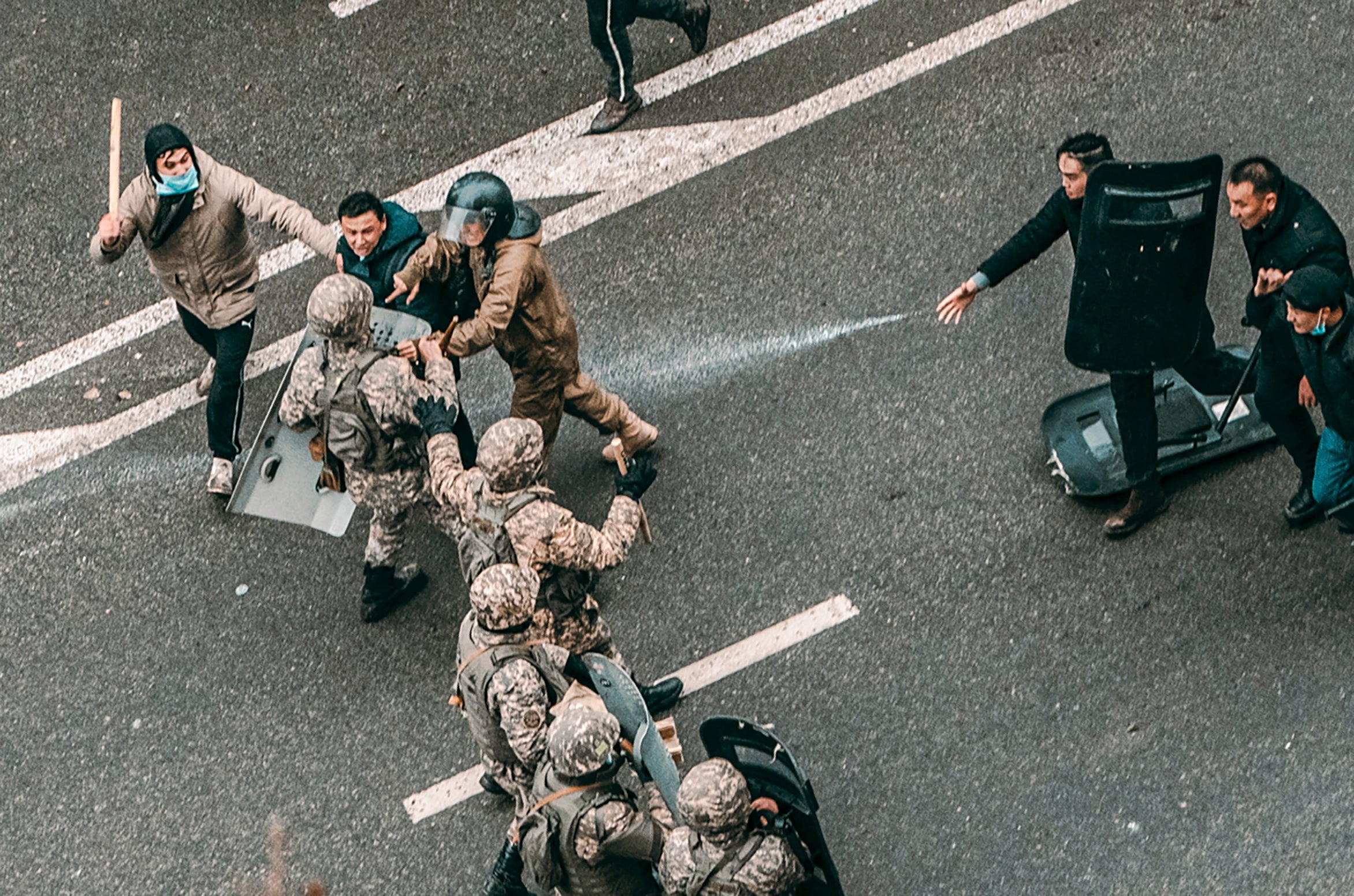‘We are angry, not terrorists’: Kazakhs deny government claims as crackdown grows
Despite the Kazakhstan government’s description of protesters as ‘terrorists’, locals say there is genuine fury over corruption in the oil-rich state, reports World Affairs Editor Kim Sengupta


The violent turmoil in Kazakhstan has continued with a rising lethal toll, as a “counterterrorist” military operation began with the country’s authoritarian ruler issuing “fire without warning” orders to security forces.
What started as protests against rising fuel costs have turned into escalating armed clashes, prompting fears of the strife spreading across the region, as troops from the Russian-led CSTO (Collective Security Treaty Organisation) arrived to guard strategic locations.
The deployment of the force of around 3,000 – the first from the CSTO, successor to the Warsaw Pact, since it was founded 23 years ago – is a potent sign of how the hitherto carefully maintained power balance is changing in the post-Soviet state, in which the west has invested economically and politically.
Exxon Mobil and Chevron are among the multinationals that have energy projects in the country. British officials point out that the international finance centre in the capital, Astana, and a special business centre have been developed with rules based on English law.
Kazakhstan’s president, Kassym-Jomart Tokayev, has followed and reinforced the policy of his predecessor, Nursultan Nazarbayev, in maintaining close links with the US and Europe as a counterweight to Russian influence. In return, western governments have, to an extent, turned a blind eye to civil rights abuses by the regime.
The Kremlin’s armed presence in Kazakhstan comes as tensions continue to ratchet up over the massing of more than 100,000 Russian troops on the Russia-Ukraine border. A series of talks between American and Russian officials, along with representatives of Nato and Ukraine, are due to start this weekend amid apprehension that Vladimir Putin is preparing for military action.
Western officials are divided on whether events in Kazakhstan and Ukraine are connected. A former American diplomat, who served in central Asia, held that the situation “gives an opportunity for the Russians to show how easily they can have military influence in a country where the US has a lot of energy interests. It can be seen as a warning to the US and its allies that what happens over Ukraine can have repercussions elsewhere.”
A number of British diplomats, however, dismissed any Ukraine links, and maintained that what was happening in the central Asian state was a distraction for Mr Putin and also a scenario he did not want at Russia’s southern borders – protests and state destabilisation.
With the opposition to his rule growing, President Tokayev is now echoing Moscow’s claims of a “foreign hand” behind the unrest. He has claimed that “terrorists” trained abroad are at work instigating attacks in the main city, Almaty, by “20,000 bandits”.
Mr Tokayev, taking on the mantle of a strongman leader, has vowed retribution, rejecting calls from the international community for talks with the opposition.
He declared in a speech: “Abroad, there are calls for the two sides to hold negotiations for a peaceful resolution. What idiocy. What kind of negotiations can you have with criminals? We were dealing with armed and well-prepared bandits, both local and foreign. Bandits and terrorists, who should be destroyed. This will happen in the nearest time.”
Ainar Omarov, a student, described how the nature of the protests changed over the course of the week. He said that initially the demonstrations had been about the sudden rise in fuel prices, but this changed to demands for greater political rights and an end to corruption.
The confrontation became more violent on Wednesday night in Almaty, said Mr Omarov. He continued: “The police were tough and a lot of the protesters now felt they had to fight back. Many government buildings were attacked, but these were just angry people, not terrorists or anything like that.”
Safiya, a 23-year-old activist who did not want her surname made public, also claimed that the government was trying to portray the protests as an insurrection.
“These are false stories to justify the harsh action by the security forces,” she said. “They are saying that guns were fired by the protesters. That is not true – if people were firing guns then they had their own agenda, nothing to do with the protests.”
British and American officials said it was unclear whether the gunshots fired by protesters on security forces came after armouries were looted, or from extremist elements, or whether supporters of the former president, Mr Nazarbayev, were involved.
Mr Nazarbayev made Mr Tokayev his successor after stepping down in 2019, seemingly appointing a technocrat, but retained some of the package of privileges he had assumed in his three decades in power, including his position as chair of the powerful Security Council.
Mr Tokayev took over that role recently from Mr Nazarbayev. He also dismissed Karim Masimov, an ally of Mr Nazarbayev, as head of the National Security Committee, which was in charge of KNB, the domestic intelligence agency.
The whereabouts of Mr Nazarbayev, known formally as the “Leader of the Nation”, is unknown. The former president has extensive connections with the UK. In 2011, former prime minister Tony Blair’s consultancy business, Tony Blair Associates, signed a deal to advise the Kazakhstan government.
Mr Nazarbayev’s extended family owns luxury property worth around £330m in London, according to a Chatham House report.
This includes a £140m property in Baker Street and a mansion on The Bishops Avenue, Hampstead. Timur Kulibayev, related by marriage to the Nazarbayevs, purchased Sunninghill Park from Prince Andrew – paying, it was claimed, £3m over its asking price.
Join our commenting forum
Join thought-provoking conversations, follow other Independent readers and see their replies
Comments


Bookmark popover
Removed from bookmarks